Podcast (top-left-corner): Play in new window | Download
You’re listening to the “Top Left Corner” on The Greylock Glass.
Editor’s Note: At this time, we are able to provide a rough transcript of interviews. By choice, we edit the text of our conversations to remove verbal pauses (um, ah, uh, you know, etc.) and fragmented phrases not to make the speakers look smarter, but to make it easier for audiences who are unable to listen to the podcast and must rely on the transcript. We attempt to remain as faithful as possible to the speakers’ original meaning, and apologize for any errors of transcription.
That said, even the imperfect transcription we perform is costly. Please support us financially by becoming a member or making a one-time contribution to help us continue to provide this service.
Jason Velázquez: And this is Episode #153 of the Top Left Corner. I’m your host, Jay Velasquez, and as always, I thank you for tuning in. This episode dropped Thursday, March 10th, 2022. I don’t know when you have downloaded and tuned into this, but I hope you’re having a great day, just the same. On this show, we have someone I have been meaning to to get on the program for some time now. Julia Lemieux, who is the founder and director of Windy Ridge Farm, just over the line in Franklin County, in Hawley, Massachusetts. Julia is one of a new generation of farmers who is really the total package. She understands not just the art and science of growing food, but she she really has a sense of how to connect with the customers and market her goods.
In one way, it’s a good thing. In another way, it’s not a good thing. The farmers today they have to do more than just, you know, grow good food. They have to connect with their customers. They have to do the social media game. They have to, you know, be out there networking. So it takes a lot more time. It’s a lot more effort when it comes to communications outreach. But again, it educates a lot of us who don’t necessarily have contact with the world of local agriculture. You can find her, in addition to at her position as a farmer at Windy Ridge farm, she is also the director of the Pittsfield Community Garden Program, which — and I didn’t know this — this actually really touches the lives of many, many people in the community and provides nutrition to families, a much, much greater number of families than I had known. She also put some time in helping to mentor youth groups. And of course, you can find her during the regular season at farmer’s markets throughout the Berkshires and western Massachusetts. Julia is one of those folks who just gives and gives of herself, and it’s a damn shame that that doesn’t spare her from from bad luck.
The wind storms that came through the Berkshires just a few days ago were devastating to a lot of folks, and Julia was not spared. Her greenhouse, which is which is quite large and heavy — you wouldn’t think that it would be easy to lift it off the ground, but Mother Nature did lift it all the way off the ground and basically made an accordion out of it. And she is not only trying to get ready for a new season, but now she has to find a way to replace this structure, and I’m going to take the time that I would normally spend pitching you about how you should be contributing to the Gorilla Glass.
I’m going to say, Hey, don’t contribute to the Gorilla Glass today in the show notes at GreylockGlass.com. Look for this episode; you’re going to find a link to her GoFundMe. It’s critically important that we do all we can to to have the backs of the farmers who work so hard to bring quality local food to our region. So I really do want you to go there to her go fund me and, you know, pitch in five bucks, 10 bucks, one hundred bucks, whatever you can, because we cannot afford to let farmers in our community suffer for something that’s as she’ll talk about is going to be more and more likely with climate change affecting weather patterns everywhere. The Berkshires are not going to be entirely spared just because of our location. So without further ado, let us have on the show. Julia Lemieux of Windy Ridge Farm.
NTRVW: Julia Lemieux, owner, Windy Ridge Farm
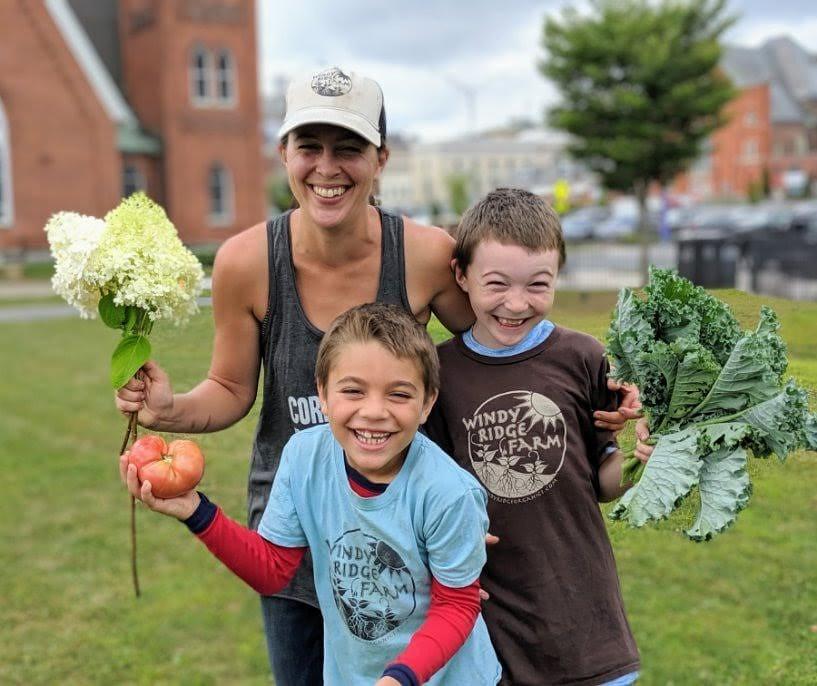
The Greylock Glass: And five, four, three two. Julia Lemieux, thanks so much for coming on the top left corner. It’s it’s great to have you on. I wish we had you on during better circumstances.
Julia Lemieux: Yeah, yeah, nice to be here.
The Greylock Glass: So you are the the owner, director, founder of Windy Ridge Farm. You got a little more than you bargained for out of the name this week. Is that is that not so?
Julia Lemieux: Yeah, the name has some irony at the moment. It’s always a little breezy up here and we’ve definitely had some wind events before. But the last two nights, Sunday night and Monday night were particularly windy and Monday night we had a really strong front come through the region and it completely destroyed one of our greenhouses here at this farm.
The Greylock Glass: I saw I saw some images of that, and I have to say, I’m so sorry. I know how heartbreaking that can be. And and you know, I think, you know, we get gusts a lot of the time, but those winds that we had were just sustained. You’ve had greenhouses up there for a number of years now. Have you ever worried about this, this kind of wreckage?
Julia Lemieux: I definitely have what I call wind anxiety any night that it’s windy, I’m kind of up and aware of what’s going on and checking to see if we still have power and checking on the green houses. And we’ve had other minor damage events with the greenhouses over the years. And it is, I think that because of climate change, unfortunately, we’re just going to see more extreme weather events. And one thing that I really worry about in our region is higher, higher wind events because of funny.
The Greylock Glass: Yeah, that for some reason, Holly, both sides of the ridge get it pretty, pretty bad. The the thing is, these are not little, you know, backyard greenhouses. These are heavy. I guess their aluminum frame is aluminum probably or galvanized? Yeah. So I mean, these are not good.
Julia Lemieux: They’re galvanized steel frame. Yes, so they’re this the way that this greenhouse broke. I watched it when it was happening. I have happened to be out trying to work on a generator and it it it collapsed and folded in. It blew up into the air and pulled it in on itself like it was made of cooked spaghetti. But this is heavy gauge steel. But the wind was so strong that it just crunched that thing right together.

The Greylock Glass: Yeah, it looks like a giant picked it up and just sort of played with it. Like I tried to make a cat’s cradle.
Julia Lemieux: You know, the giant wings, basically.
The Greylock Glass: Yeah, no. It’s it’s something to see now. This is this is one of those things that many people don’t fully appreciate. They know that farming is hard work. They know that it takes dedication. Some people kind of understand that it’s more than a job. It’s kind of it’s kind of who you are. It’s kind of your life. They don’t always understand that you really are. At the mercy of the environment. Talk a little bit about some of the things that this, you know, and you can bring climate change back into it if you want to, because I want to. I want to go back to that for a bit, but talk about some of the things that you have to put up with weather wise in the last few years that a lot of people don’t think about.
Julia Lemieux: Sure, yeah, I mean, one of my favorite sayings when I’m at the farmer’s market with customers is that we’re growers, not magicians, because we’re farming. Every every year is different. The weather is never going to be exactly the same twice. There’s always going to be variables more so than I think any other business, really. And that is how it becomes kind of like part of who you are and part of your lifestyle because the hours are, you know, more than more than most jobs, that’s for sure. And yeah, it’s just kind of a different business and there are a ton of variables and people will sometimes complain, you know, why isn’t the lettuce ready yet? Or, you know, why is why does this plant look this way? And you know, all I can do is do the best I can with the inputs that I have. But the bottom line is I can’t control the weather and I’m not a magician so that we are where we’re at. We’re at the mercy. If Mother Nature gives us three weeks of cloud, when we’re growing out our tomato seedlings, they’re going to look a lot different than they do. When we have three weeks of Sun and I as a greenhouse grower, I can’t do anything about that. Right, right. It comes up a lot. And you know, in that way, it’s kind of a good chance to offer people a little bit of an education on what farming is really like, especially at the farmer’s market.
Julia Lemieux: When you’re maybe dealing with with folks who aren’t farmers and and don’t really know what day to day life is like on the farm. Yeah. And again, in terms of climate change, we always we’ve definitely had other wind damage here at the farm. Nothing anywhere near this extreme. And then also the if this had happened in August, it really wouldn’t be as big of a deal because I would have some time to try to get funds together and plan a new build and order all the parts. This greenhouse is normally filled at the beginning of April, and we grow out seedlings in it for about a month and then we deliver all the seedling orders during the month of May. And then we use the space for in-ground production for the rest of the summer and fall. So it it happened. The timing could have been worse. It could have been two or three weeks from now, but the timing couldn’t be a lot worse and we’ve never had damage that’s occurred at this crucial moment in the growing season. And we still expect there’s usually some spring winds as the seasons kind of change out here in Holly. And I’m still I know that wasn’t the last windy day we’ll have in March and April. It’s always kind of a breezy couple of months in the early spring. Well, that’s the thing.
The Greylock Glass: Yeah, that’s the thing that really freaked me out because this I mean, we haven’t. We’ve just we’re just beginning that season.
Julia Lemieux: Yeah, the switch. Yeah. And usually the time it gets dangerous when the ground is really thawed because it’s so soft. And that’s when a lot of damage will happen with structures and trees in the wind because they lose that frozen winter ground to this muddy. We go into mud season and we haven’t really turned that switch yet up here if we’ve had a couple of muddy days. But as we’re talking right now, the ground is covered with snow. Again, we’ve got snow and falling snow.
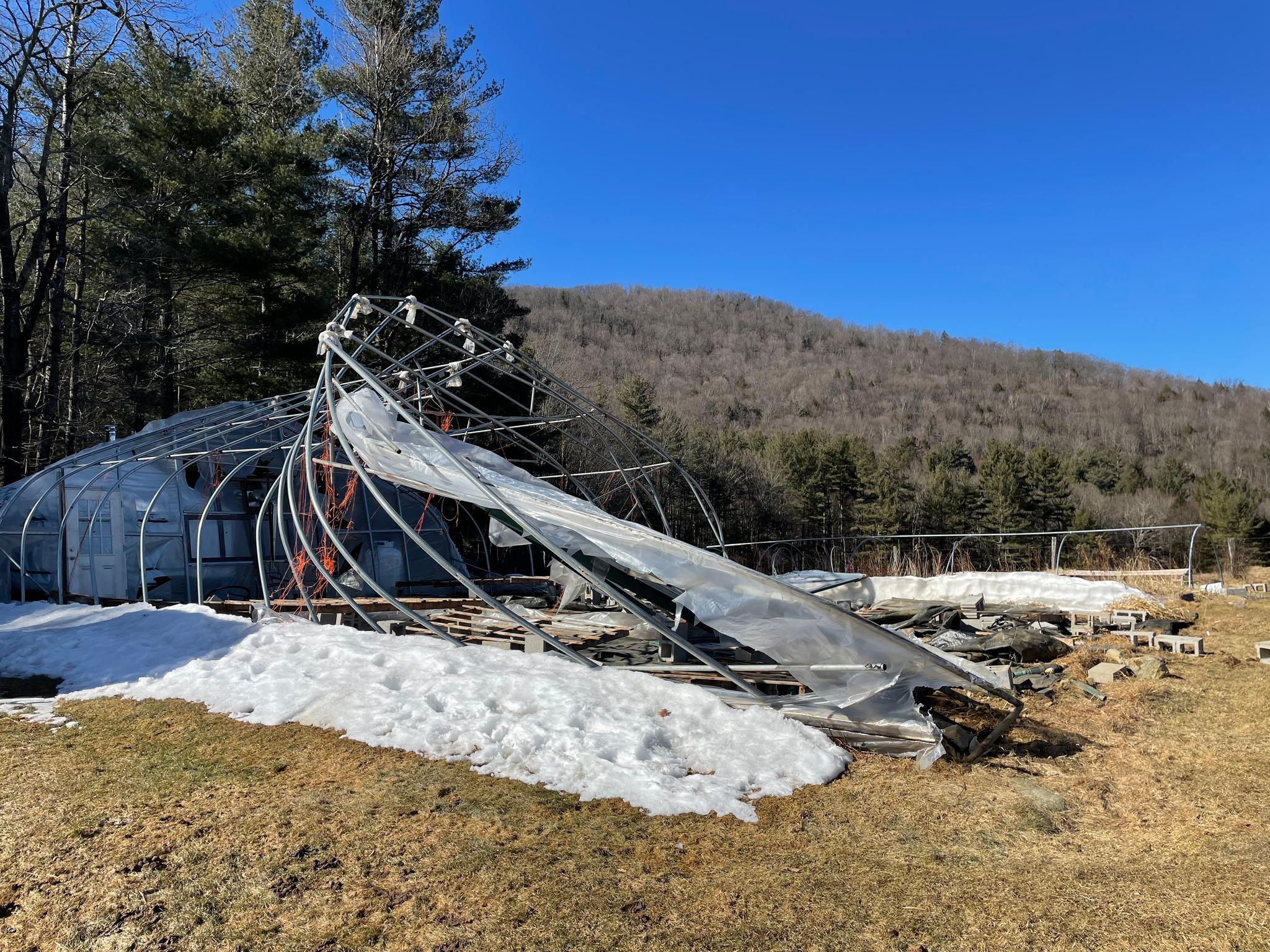
The Greylock Glass: And now I mean, they call snow the poor man’s fertilizer, but I’ve had enough of that fertilizer. To be honest, this year, you know, I think I think about climate change and I think about the the extreme heat that so much of the country gets these days every year, a little hotter, little hotter. And I think about the crop failures that we’ve seen in corn and wheat and certainly the fires in California and elsewhere have destroyed so much of the fruit production. To me, New England is as challenging as it can be to be a farmer in New England. New England seems like a really important region of the country to protect when it comes to farming. Just because we have not and I’m knocking on wood here, particleboard anyway. We are we haven’t seen the the most dramatic impacts of climate change yet. And yet if you look at western Massachusetts, you see more and more homes coming up little in McMansions. Do you have any thoughts about the ability of New England to sort of become a powerhouse of agriculture again as needed, especially with what’s going on on the global stage?
Julia Lemieux: Yeah, I mean, I think with New England, there’s a couple of things. One is, I really do believe that we’re slightly more cushioned from near near-term climate collapse. Like you said, we’ve we’ve been lucky and that we haven’t had like large wildfires and some of the other really awful things that are happening around the world and around the country. And then also, we’ve got a lot of smaller, more diversified farms in the area. So, you know, out West, you’re looking at huge monocultures and that that just doesn’t work. That is not a model that will sustain us into the into the far future. And so what what New England has is the model that works better. I’m not saying it was perfect, but smaller scale, diversified production has more climate resilience than any of these large scale farms, and I don’t know that it’ll happen in our lifetime. But at some point, those those large industrial farms there will be collapse. We don’t have enough genetic diversity in what is being grown. What people are eating is far less diverse than it was a hundred and fifty years ago in terms of the types of food and the varieties within those types of food. We’ve got one or two companies that are, you know, supplying I’m thinking of cheese as an example. One company supplies the culture that makes about half the world cheese. And so when you have when you have that type of control of the food system, it’s not going to end well. And what we need are the small scale diversified farms and businesses. And I think New England’s got a really healthy population of that, particularly in western mass, but New England as a whole. So I just think it’s it’s a good place to be and we’re really lucky to be able to live here.
The Greylock Glass: Yeah, we’re also not facing the erosion that a lot of the other, you know, parts of the country, especially the Midwest are facing. I was reading just this week about micronutrients and how in recent studies there are far, far fewer micronutrients in the soils where most of America’s food is being produced. But in the case of New England, we don’t have quite that erosion because we don’t have, you know, hundreds of square miles of flat, flat growing, you know, tillage that will blow away in the wind.
Julia Lemieux: But yeah…
The Greylock Glass: You know, we have we have all of these rocky hills and dales and in nooks and crannies,
Julia Lemieux: Yes, nooks and crannies. And you know, if you ask any New England farmer, our best crop is our rocks.
The Greylock Glass: Usually we get some, we get some good rocks.
Julia Lemieux: Yeah, shale grit requires some different modes of thinking to make it to global soil and to make it a good place to grow healthy food. But I think in general, it does have a, you know, better micronutrients and something that’s been monographs for decades.
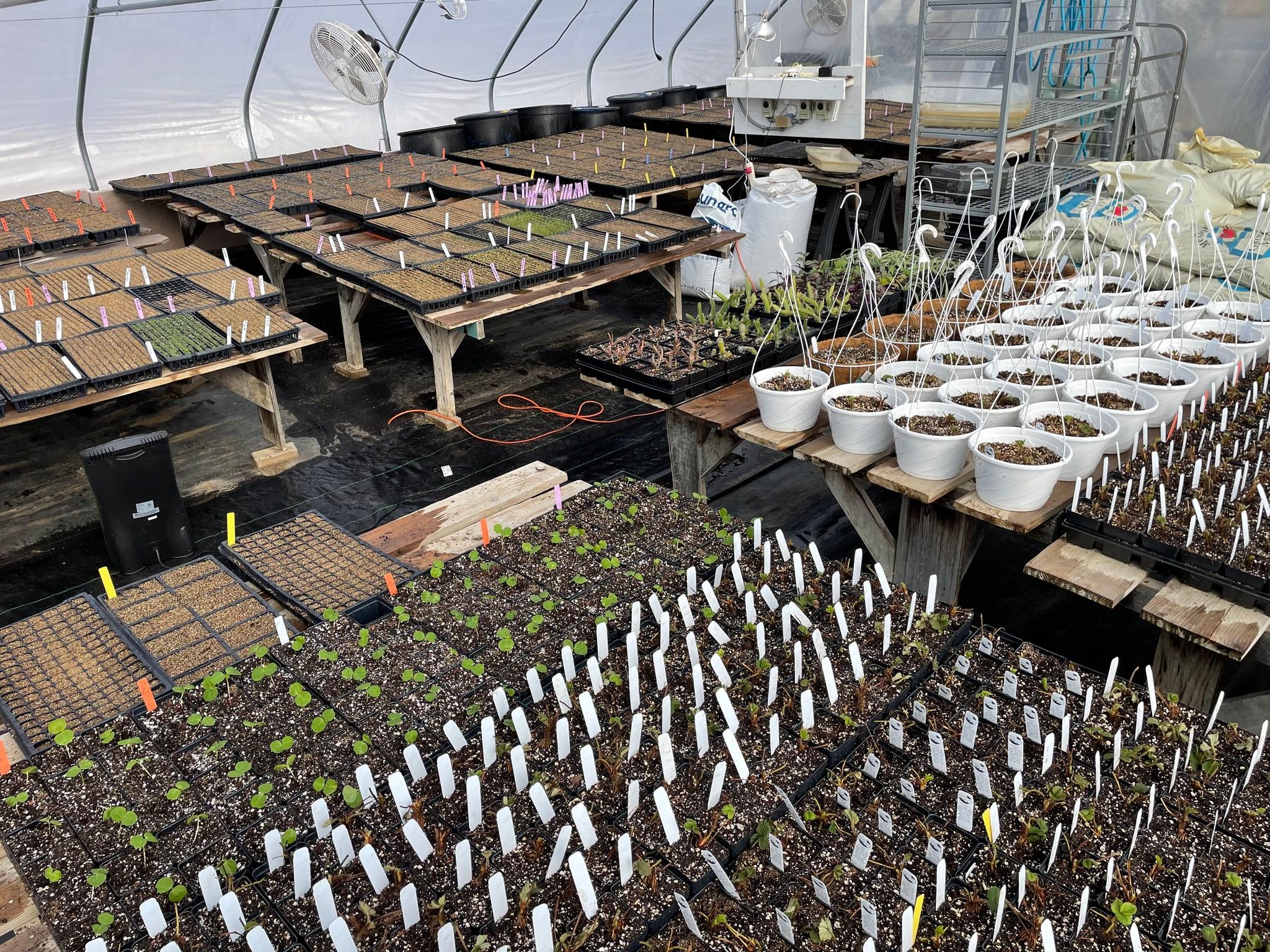
The Greylock Glass: Right, right. Well, I I guess I do want to, you know, point out and many of our listeners and the readers of the of the show are pretty familiar because, you know, they’re farmers market shoppers, they’re they’re aware of of a lot of these issues, they might not know you, though the, you know, those in Pittsfield might. Why don’t you describe your role as the as the community garden director of Pittsfield?
Julia Lemieux: Yeah, yeah, so we in addition to having our little certified organic farm up here that we founded in 2009, in Holly since 2013, I’ve been working down in the city of Pittsfield with the Office of Community Development there, managing acting as their city community gardeners. So I’m managing a few community gardens throughout the Morningside and West Side neighborhoods in Pittsfield, and we’ve got five garden sites currently. And over the years I’ve helped various, you know, nonprofits and schools either get a garden program in space going or help them maintain or revitalize existing space. We work a lot with some of the larger food pantries in Pittsfield or South Congregational and the Christian Center on Robin Vav. We actually have a community garden at the Christian Center, so that’s, you know, we grow some food for community members, folks help out in the garden who are from the neighborhood. We work with a few team groups, including roots driving. They do like a youth work program, some really great youth development in Pittsfield. So we have those groups in the gardens and we’ve got a couple, we’ve got a garden at a housing development, so we’ve got residents that grow their own food. And then we also grow some food for other residents who, you know, aren’t able to be in the growing space or don’t want to be. We bring the veggies back in for them. So it’s been a really amazing program. Covid was was difficult for us because one of the main benefits of gardening in my eyes at that scale is the therapy that you get being in community in these spaces.
Julia Lemieux: And a lot of the community members I work with are disabled or are very high risk for COVID complications. So we we sort of had to decentralize over the last couple of years and come up with schedules, so we wouldn’t all be in the space at the same time. And so we really had to adjust what the program looked like the last two years. And I’m looking forward to getting back into educational events. We’re doing a see starting event at the beginning of April at the Berkshire Athenaeum and things like that, where we can gather in groups again and be in community together. So I’m looking forward to that. And we’ve always had a we have a couple of gardens at elementary schools as well. And during the pandemic, a lot of our in-person educational programming had to, you know, it went away, schools were closed. And so we’ve been gradually working our way back into that educational programming for the K to five age group, which I think is so, so, so important that kids know that they can grow their own food. Yeah, yeah. It’s a great program in the city. Does they fund this program? And they’re very supportive of the program and it’s an important piece. There’s a lot of environmental pollution and Pittsfield from General Electric, and I think it’s it’s nice to see the city getting behind a program that kind of works to. Revitalized and just bring some environmental justice to some of these neighborhoods that were harmed so deeply by that pollution.
The Greylock Glass: Yeah, yeah, no, I think I think certainly it’s always a matter of making sure that the next generation has the foundation, you know, for understanding and for and continuing. We certainly can. It’s clear should be clear anyway by now that we cannot rely on five companies to bring us 85 percent of our food. You know, listening to you, I think most people should understand that you are. You’ve been at this game a little while and you’re, you know, one of the region’s, you know, experts. There’s a lot of a lot of smart farmers out out our way, but you’ve definitely been, you know, you’ve been at the practice a long time. If somebody were want, would you want to hire you for consulting? I don’t know where you’d find the time. Yeah, but but you’d be up for that, right? If if a town wanted to start a community gardening program, they could they could contact you, right?
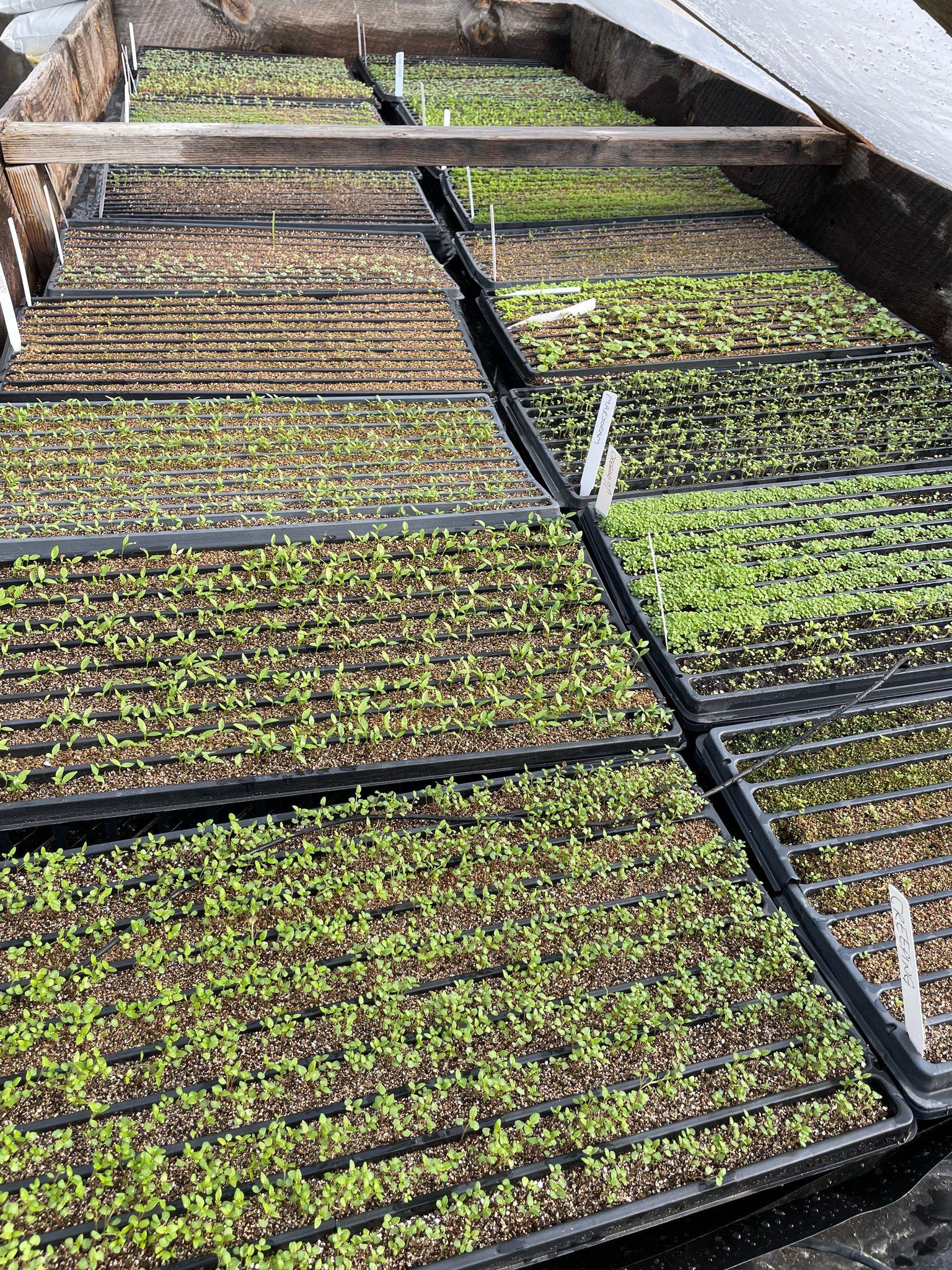
Julia Lemieux: Absolutely. Yeah, no, I’m always I’ve definitely talked to a lot of folks outside of Pittsfield on whatever they’ve got going on for their projects. I, because of the farm business, is mostly organic plants and then we do a little bit of produce. So I always try to aim for months that are not, you know, April and May and June because they tend to be really busy months for our business. But later in the summer and the fall and the winter months especially, there’s more bandwidth for helping people kind of do a little bit of, you know, what is their vision and how do we make that happen and sustain it over the long term? Because that’s an important piece to a lot of these community led projects and making sure that it has a long term future and that it won’t end up, as you know, people kind of have interest initially and then and then they don’t, and it becomes really hard to maintain.
The Greylock Glass: Yeah, yeah, I have seen those. There’s a few schools in western mass that had garden, you know, like sort of as I don’t know whether this is a club or as a class, but there are greenhouses attached to schools sitting disused. And it’s so sad to see that somebody had the fire at one point in time, but it’s sort of, you know, petered out. But I think when people see it, see you at the farmer’s market and see that the I mean, you’ve always got just the most gorgeous starts. So if if this well, if the rest of this spring doesn’t, you know, doesn’t keep up, it’s abuse of you. I’m sure you’ll have. I’m sure you’ll have more, more great starts and people can find you OK. There’s a lot of information. A lot of it’s going to be in the show, notes listeners. We’re going to have links not only to windy ridges social media page, and we’re going to have links to probably the farm markets that you belong to. And in other places. But what I really want to do before we before we do that and that way people can find you where you’re growing because I know you update your your Facebook page of where you’re going to be.
The Greylock Glass: So once they have that, they have almost everything. But right now, I want to talk about this greenhouse. I want to circle back around because that’s key greenhouses. I have A.. And and after we say goodbye, like technically on the phone, I’m going to want to keep you on the phone afterwards because I want to talk to you for about something, but. I have been to the farm tech catalogue, and I drool, I drool over the greenhouses. There’s like a ninety six footer that I want so badly, but it is not cheap. It is. I mean, you could buy a house for about the same same price as these greenhouses. These are show they’re not cheap, but it cost of steel has gone up so high in the last couple. Yeah, that yeah, it’s it’s insane. I just wanted to buy fencing and I’m like, Oh my lord, that fencing is out of, it’s out of control. So you’re talking thousands of dollars to to repair this, this greenhouse and you started. It is a go fund me, right?
Julia Lemieux: Yeah, I did start a go fund me at 3:00 in the morning yesterday. A couple of hours after I watched watched us lose our greenhouse. And yeah, just just knowing that again, the cost of everything has really skyrocketed the last couple of years, particularly steel and the cost of labor. So I started to go fund me yesterday and I I’ve been really, really touched with how the Western math and beyond community is kind of rallying around this project. So that been a bright spot in the last 48 hours, for sure.
The Greylock Glass: Yeah. Well, you know, you are a pillar in the in the community, in the agricultural community and just in general. And I think people, you know, you’ve been good people to to so many people, you’ve been helpful. You’ve always been willing to share your knowledge and your experience with folks. And I think that it’s one of those cases where it actually comes back to you. It’s nice to know, isn’t it, that it actually does. Sometimes it really, really.
Julia Lemieux: And it’s nice again being in such a rural area. You know, my customer base is all over. I have accounts in Connecticut and in the Connecticut River Valley and over in the Berkshires. So it’s it’s a little geographically disjointed and it’s been amazing on the go fund me and on social media. Just sometimes when I’m up here working by myself, you forget that there are people behind you. And so when something unexpected like this happens, it’s just it’s been really sweet to see, you know, folks that are far away and not right at the farm are ready to help and want to see things get put back together.
The Greylock Glass: Yeah, yeah. And and I hope that our listeners will join in that that effort because we really want to see I mean, I can either grow my own store or I can buy a Julies. And I think I would rather just buy Julius because she does them so well. So we want to definitely get you up and running again. Again, stay on the phone after we say goodbye. But so I guess for now, we’re going to put the link to that go fund me in the show notes. People can go there and give till it hurts. And and Julie, I just want to say thanks for talking to us and we will see what the farmers markets this summer.
Julia Lemieux: Oh, yeah, I look forward to it, we’ll see you then.
Jason Velázquez: Again, look for the link in the show notes to Julia’s GoFundMe page. It is so important that we not let down our local farmers when they need help. It’s hard enough as it is getting so little sleep working so physically, such physically demanding work and then putting on a smile every Saturday morning or whatnot to show up and face the crowds at the farmers market.
Jason Velázquez: You just you have no idea and and you never get any, you never get any rest. So please do your part pitch in a couple of bucks to help. Windy Ridge Farm replace that greenhouse. And of course, the links to her social media presence are in the in the show notes as well. And I do hope that she’ll follow her because then you can find out what she has and when it’s going to be ready all season long. As you heard she is the and I’m not kidding, I buy my starts from her too. She is the place to get everything from tomato starts to. I think she’s typically has cucumbers, peppers, but find out. I mean, that’s what that’s what why you should follow her on Facebook and other any other social media platforms that she uses. Because then you’re not going to get to the farmer’s market and wonder why all the all the tomato starts are gone. You won’t do that because you’ll know weeks in advance when they’re going to be ready. So that’s that. Another edition of the top left corner under our belts and I look forward to, well, actually, you should be looking forward to the next episode is going to feature conversation with a cold case specialist who, you know, works on cases that are, you know, 10, 20, 40 even more years old.
Jason Velázquez: Dr. Sarah L. Stein, who was a psychologist who who looks at this from a much different perspective than the gumshoe your standard gumshoe way. And we’re going to be talking to her about even though she doesn’t have direct knowledge, but we’re going to be talking to her about the Benoit disappearance and then later murder and and other other some of murders that she has been following. Tracking you a little bit. We also are going to be joined by Andrea Harrington, District Attorney of Berkshire County, Massachusetts, who is going to give her take on this. This very well. It’s a heart wrenching case that has been in the public consciousness lately, so please do. Be sure to tune in next week. And don’t miss that episode. There may even be some bonus content that’s available only to members, so it might be a good time now to sign up for a membership of $5 or more to make sure you don’t miss out on any of that. Ok? That’s our show for the week. Thanks for tuning in. Until next time, stay safe. Be good to each other. And for God’s sakes, go easy on yourself. Bye bye.
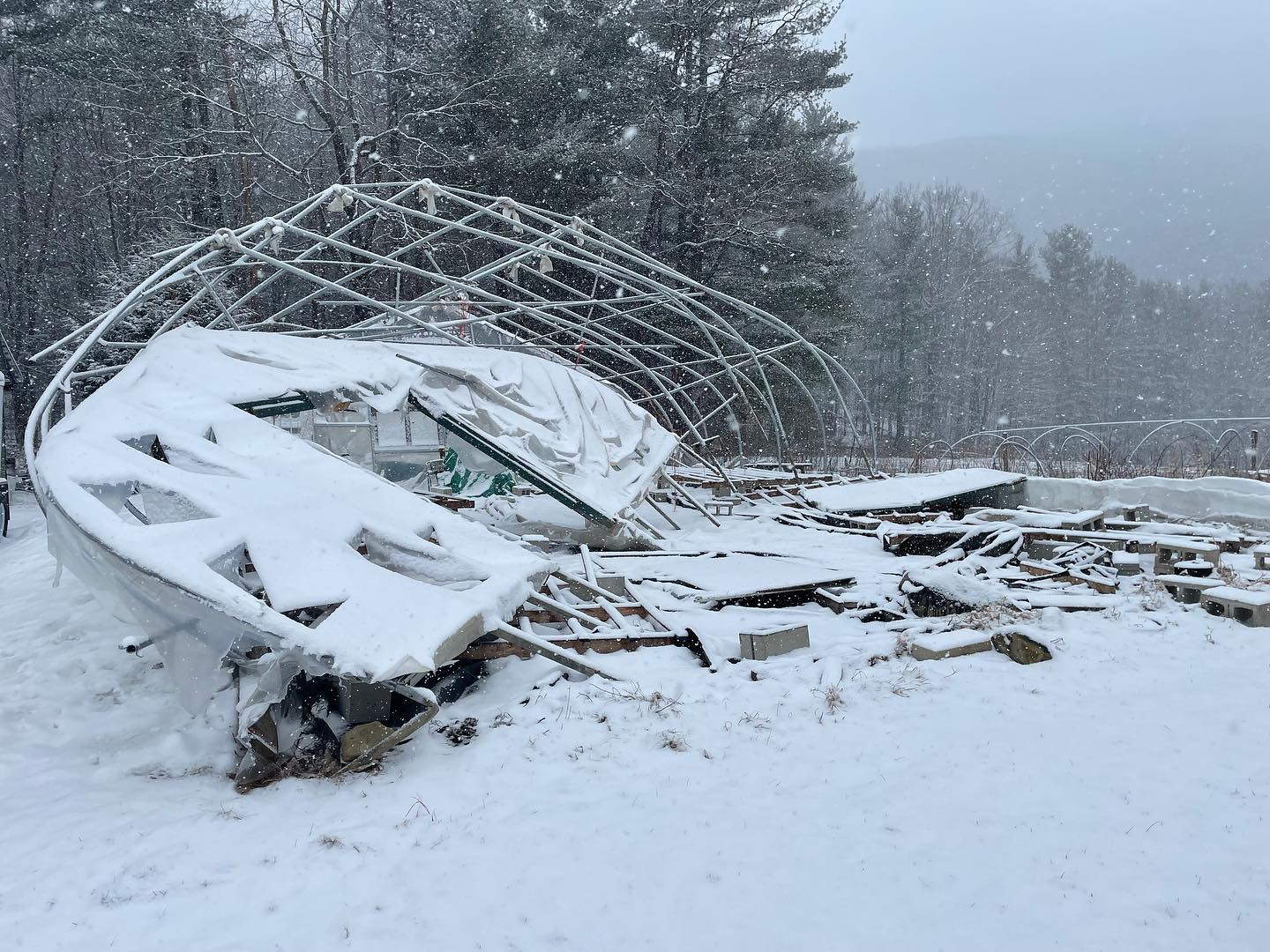




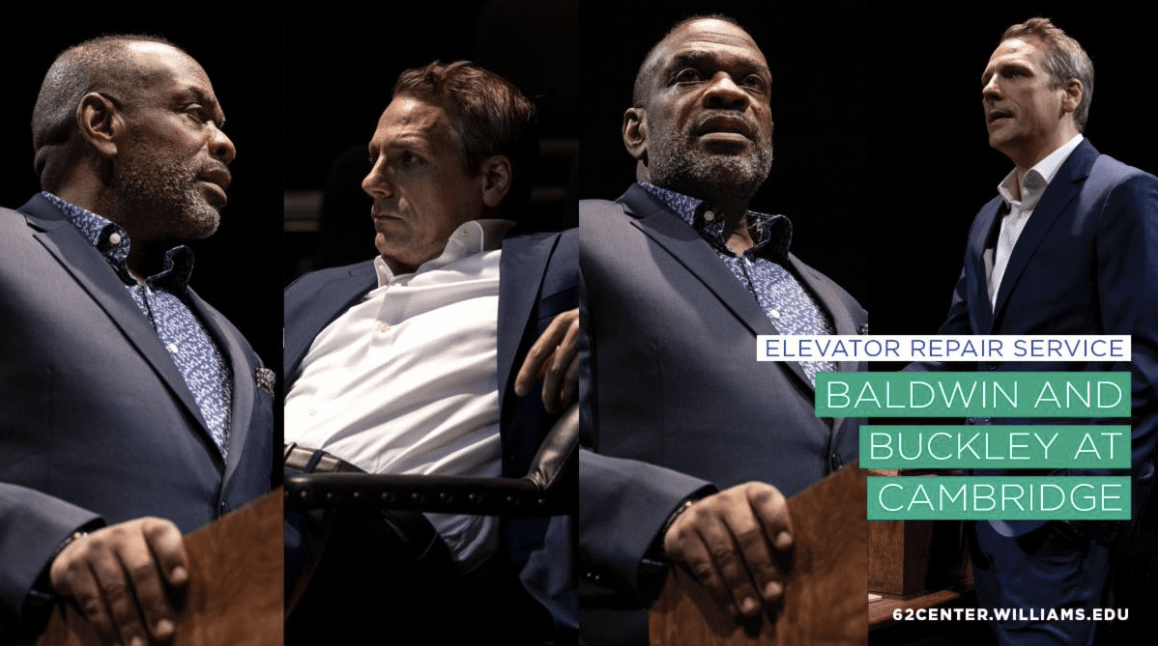
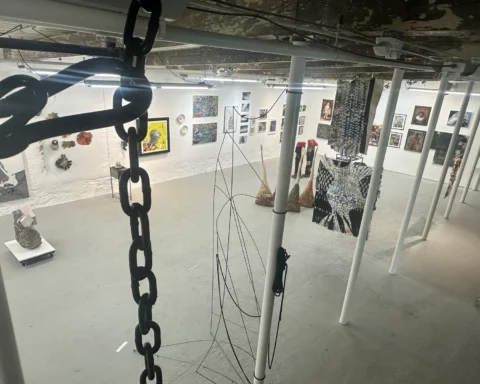
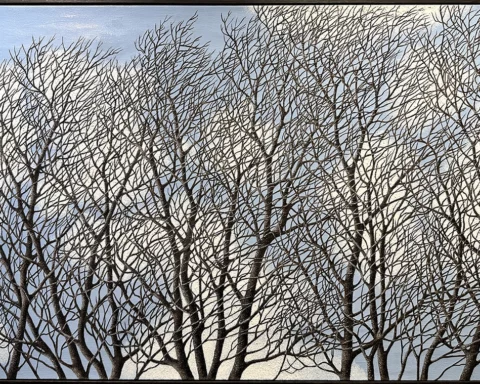
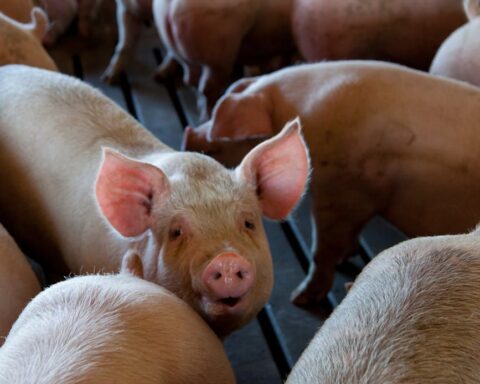

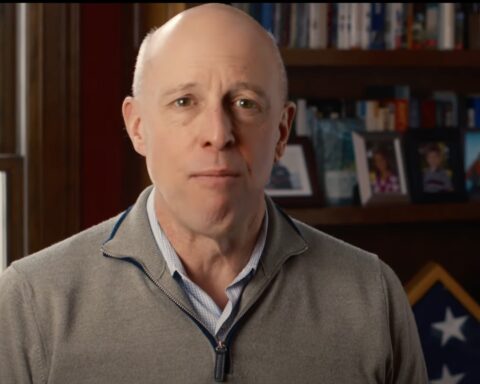









You must be logged in to post a comment.